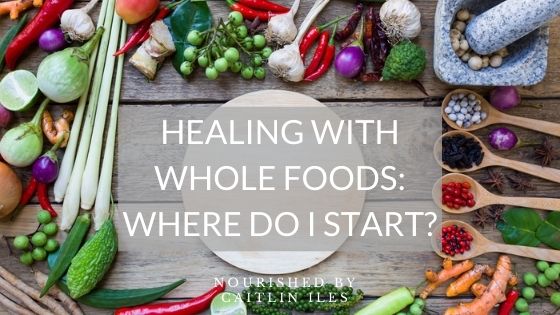Hi friend! Today I want to share a post all about some of the powerful health benefits you can gain from switching the way you are eating to a predominantly whole foods based diet.
I have shared a bit of information on Where to Start when it comes to this whole healthy eating thing, but I wanted to post some more detailed information about how I typically approach dietary changes with my clients. Now for some people, we will jump right in and start making most of these switches right away. With other clients it’s more of a one-at-a-time process.
Either way is fine and you just have to see which way works best for you to maintain long-term. If you’re looking for some guided support in this process, I’m running my brand-new Happy Belly, Brain, & Body: The Love Your Healthy Self Nutrition Program for 28 days starting on Monday, January 18th. You can read all about it right here!
When it comes to managing health conditions, such as diabetes or heart disease, diet can be a powerful tool to have in your arsenal. I want to couch this in a very strong caveat: Diet is by no means the only factor at play when it comes to health outcomes as stress (everything from financial to interpersonal); racial trauma experienced by Black, Indigenous, and other racial minorities living in racist culture; access to healthcare; insecure housing; and food insecurity to name a few issues, impact a person’s ability to even have their most basic needs met. Until these issues are acknowledged and addressed, true health for the entire population will not be achievable. If you’re interested in learning more you can look up food insecurity in your hometown (this is a study I found for my hometown), check out the research & work being done by the Black Health Alliance in Canada, and read some of the links I’ve shared above. I will be sharing more in depth information on these topics as I become more educated.
Now, if you are interested in learning how making small, but meaningful changes to your diet can can lay a foundation that can help resolve or manage many symptoms thanks to the removal of blood sugar disrupting foods, toxic additives, and inflammatory fats keep reading! Oftentimes using a critical care diet in the short term and then transitioning to a broader, whole-foods based diet can be a key to achieving and maintaining health long into your golden years.
The Definition
First off, it’s important to define what constitutes a whole foods diet. These diets focus on foods that are eaten as close to their natural state as possible. It includes fresh organic fruits and vegetables, pastured or naturally raised animals, wild game, sustainably caught fish, nuts and seeds, legumes, gluten-free whole grains, and cold-pressed anti-inflammatory oils. In some people legumes and gluten-free grains may need to be eliminated in the short term to resolve any digestive or other health issues.
The Finer Details
When it comes to choosing your animal protein sources you want to make sure you are purchasing animal products that have been raised sustainably and ethically and that have been fed their physiologically appropriate diets. When animals are raised on feedlots they are forced to stand knee-deep in the own feces, they are fed grains when their natural diet is based upon grasses, they are often given hormones to help them grow bigger, and they are pumped full of antibiotics to counteract the illnesses that are rampant due to their living conditions. When you eat this meat you are essentially eating a toxic food that is full of stress hormones, inflammatory fats, chemicals, and antibiotics.
If you choose to eat animals that have been raised with space to roam and grass to eat, the amount of healthy omega-3 fats increases and you are left with a healthier food. You can also incorporate healthy amounts of anti-inflammatory fats and plant based protein by consuming nuts and seeds such as hemp hearts, almonds, walnuts, macadamia nuts, Brazil nuts, pecans, pumpkin & sunflower seeds.
If you are suffering from digestive issues it can be a great idea to soak your nuts overnight and then lightly dry them or toast them in the oven. Soaking removes some of the phytic acid and anti-nutrients that can make them more difficult to digest. Other great sources of plant-based protein include beans, chickpeas, various lentils, quinoa, buckwheat, spirulina, and wild rice.
Focusing on healthy fats and oils such as coconut oil, olive oil, avocado oil, butter, or ghee will help induce a healthy inflammatory response in the body. Other fats that can be used in moderation (and in cold preparations only) include some polyunsaturated oils such as hemp, flax, walnut, or camelina. There are certain fats that, when eaten in excess, promote an inflammatory state in the body and you want to avoid using them as your primary fat sources on a whole foods diet.
The most important fats to avoid include vegetable oils such as canola, peanut, soy, corn, safflower, sunflower, and cottonseed and any oil that has been hydrogenated or partially hydrogenated. They have been so over-processed that they are often rancid by the time they get to your table, which promotes inflammation and exacerbates underlying health conditions. You can learn more about healthy fats and how to use them here.
Now no explanation of a whole foods diet would be complete without mentioning the importance of adequate veggie intake. I recommend getting at least 6-8 cups of fresh, organic produce for the healthy fibre content that stabilizes blood sugar, antioxidants that help fight inflammation, and plant compounds that promote healthy detoxification.
To help budget your groceries and spend your money thoughtfully you can refer to the EWG’s Clean Fifteen and Dirty Dozen list for foods that should always be bought organic due to high pesticide load. I also have an article on How to Eat Healthy on a Budget. I also suggest getting 1 or 2 servings of fruits such as berries, apples, and melons a day as they are often chock-full of potent anti-oxidants. If you have blood sugar issues you may need to be more mindful of some higher starch fruits such as bananas or mangos, though I implore you not to be afraid of carbohydrates! They are necessary and healthy components of any diet.
Some Notes on Healing Diets
When in the crucial healing phase of any condition, such as diabetes or an autoimmune condition, it is best to focus on the above foods while eliminating all beans, legumes, and grains due to their interference with mineral absorption and possible irritation to the gut lining. However, once conditions, such as blood sugar imbalance or leaky gut, are under control a careful reintroduction of properly prepared beans, legumes, and gluten-free grains can be a healthy addition to a whole foods diet.
You may want to avoid reintroducing wheat, barley, rye, spelt, kamut, triticale, and some oats into our diets because they contain gluten, which is the protein that gives these flours their sticky quality. Gluten causes an increase in intestinal permeability and can contribute to inflammatory conditions throughout the body due to its effects on blood sugar balance. Eliminating it is one of the best things you can do to maintain a healthy diet.
Once you are feeling well, gluten-free grains, such as millet, buckwheat, teff, quinoa, and brown or wild rice can be included in the diet based upon tolerance. Make sure you accurately test and keep track of how these foods make you feel. I strongly believe in the saying that one person’s cure is another person’s poison. So something that may be nourishing and delicious for your sister, neighbour, or friend, could cause horrible digestive upset or other issues for you. As always pay attention to the signals your body sends you.
You can also look at reintroducing some healthy beans such as black, kidney, aduki, fava, navy, pinto, and garbanzo beans. It is important to soak your beans overnight before cooking them as this can help deactivate some of the phytates and lectins that bind to minerals in the body. If you find that beans make you gassy, cooking them with a strip of kombu in the water can help absorb the problematic fibers that cause the issue. Beans are great sources of fibre and protein to help balance blood sugar. Lentils such as red, beluga, or French lentils contain similar benefits and should be prepared in the same way.
Bonus Foods
Another super important special aspect of a whole foods diet are fermented foods. I’ve written many posts on the benefits and have tons of recipes for making your own fermented foods quickly and easily at home, so check out more information in the above links for more information. Basically, fermented foods help boost immune function and help with digestive function, so try to eat at least 1 to 3 small servings a day of these magical foods.
Following a whole foods diet can be a great foundational change you can make to help bring your body back into balance by taking away the toxins, chemicals, and foods that are making you sick and giving your body the nutrients it needs to thrive. Hopefully this little intro guide has given you some ideas on where to start on this food journey. This will always be based upon your current diet. If you’re already gluten-free, but still eating refined vegetable oils, you’ll want to start by swapping out oils for example.
If you’re looking for a way to kick-start some healthy habits, self-love practices, and figure out which foods are keeping you feeling sluggish, bloated, or anxious then check out my new Learn to Love Your Healthy Self Nutrition Challenge! It’s a 28 day guided program (complete with online cooking classes, guided meditations, yoga classes, and Q & A sessions!!) to give you the tools & knowledge to make lasting habit changes to help improve your sleep, clear up your skin, improve digestion, & balance out your moods with just a little bit of time dedicated to your self care & nutrition every day.
You can check out all the information right here and if you sign up by midnight on Wednesday, January 13th, you’ll get a special discount!I’ve already got a great group excited to start Monday, January 18th. You can read about all the details here.
As always, thank you for your support!
Have a fabulous day, stay safe, and take care of one another!
Cait xo





Trackbacks/Pingbacks